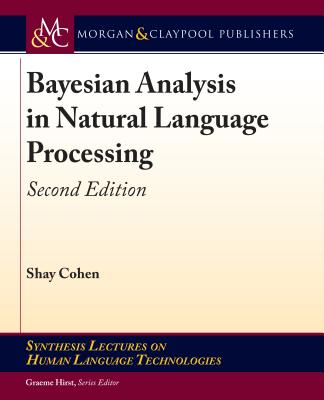Hands-On Markov Models with Python: Implement probabilistic models for learning complex data sequences using the Python ecosystem
暫譯: 使用 Python 實作馬可夫模型:利用 Python 生態系統實現學習複雜數據序列的機率模型
Ankur Ankan, Abinash Panda
- 出版商: Packt Publishing
- 出版日期: 2018-09-28
- 售價: $1,650
- 貴賓價: 9.5 折 $1,568
- 語言: 英文
- 頁數: 178
- 裝訂: Paperback
- ISBN: 1788625447
- ISBN-13: 9781788625449
-
相關分類:
Python、程式語言
海外代購書籍(需單獨結帳)
買這商品的人也買了...
-
 $422概率編程實戰
$422概率編程實戰 -
 $352Python 貝葉斯分析
$352Python 貝葉斯分析 -
 $408強化學習精要:核心算法與 TensorFlow 實現
$408強化學習精要:核心算法與 TensorFlow 實現 -
 $332GAN : 實戰生成對抗網絡
$332GAN : 實戰生成對抗網絡 -
 三菱可程式控制器 FX3U-1PG 單軸伺服定位模組中文使用手冊中文使用手冊
三菱可程式控制器 FX3U-1PG 單軸伺服定位模組中文使用手冊中文使用手冊$500$450 -
 $248PHP7.0+MySQL網站開發全程實例
$248PHP7.0+MySQL網站開發全程實例 -
 $1,308Applied Deep Learning: A Case-Based Approach to Understanding Deep Neural Networks
$1,308Applied Deep Learning: A Case-Based Approach to Understanding Deep Neural Networks -
 CSS Master
CSS Master$1,560$1,482 -
 還在漫無頭緒?一本書帶你走完 Python 深度學習
還在漫無頭緒?一本書帶你走完 Python 深度學習$690$587 -
 無印良品的 PDCA:常勝經營法,一本筆記本就夠了!
無印良品的 PDCA:常勝經營法,一本筆記本就夠了!$350$277 -
 Machine Learning for Algorithmic Trading, 2/e (Paperback)
Machine Learning for Algorithmic Trading, 2/e (Paperback)$2,300$2,185
商品描述
Unleash the power of unsupervised machine learning in Hidden Markov Models using TensorFlow, pgmpy, and hmmlearn
Key Features
- Build a variety of Hidden Markov Models (HMM)
- Create and apply models to any sequence of data to analyze, predict, and extract valuable insights
- Use natural language processing (NLP) techniques and 2D-HMM model for image segmentation
Book Description
Hidden Markov Model (HMM) is a statistical model based on the Markov chain concept. Hands-On Markov Models with Python helps you get to grips with HMMs and different inference algorithms by working on real-world problems. The hands-on examples explored in the book help you simplify the process flow in machine learning by using Markov model concepts, thereby making it accessible to everyone.
Once you've covered the basic concepts of Markov chains, you'll get insights into Markov processes, models, and types with the help of practical examples. After grasping these fundamentals, you'll move on to learning about the different algorithms used in inferences and applying them in state and parameter inference. In addition to this, you'll explore the Bayesian approach of inference and learn how to apply it in HMMs.
In further chapters, you'll discover how to use HMMs in time series analysis and natural language processing (NLP) using Python. You'll also learn to apply HMM to image processing using 2D-HMM to segment images. Finally, you'll understand how to apply HMM for reinforcement learning (RL) with the help of Q-Learning, and use this technique for single-stock and multi-stock algorithmic trading.
By the end of this book, you will have grasped how to build your own Markov and hidden Markov models on complex datasets in order to apply them to projects.
What you will learn
- Explore a balance of both theoretical and practical aspects of HMM
- Implement HMMs using different datasets in Python using different packages
- Understand multiple inference algorithms and how to select the right algorithm to resolve your problems
- Develop a Bayesian approach to inference in HMMs
- Implement HMMs in finance, natural language processing (NLP), and image processing
- Determine the most likely sequence of hidden states in an HMM using the Viterbi algorithm
Who this book is for
Hands-On Markov Models with Python is for you if you are a data analyst, data scientist, or machine learning developer and want to enhance your machine learning knowledge and skills. This book will also help you build your own hidden Markov models by applying them to any sequence of data.
Basic knowledge of machine learning and the Python programming language is expected to get the most out of the book
Table of Contents
- Introduction to Markov Process
- Hidden Markov Models
- State Inference: Predicting the states
- Parameter Inference using Maximum Likelihood
- Parameter Inference using Bayesian Approach
- Time Series: Predicting Stock Prices
- Natural Language Processing: Teaching machines to talk
- 2D-HMM for Image Processing
- Reinforcement Learning: Teaching a robot to cross a maze
商品描述(中文翻譯)
**釋放無監督機器學習在隱藏馬可夫模型中的力量,使用 TensorFlow、pgmpy 和 hmmlearn**
#### 主要特點
- 建立各種隱藏馬可夫模型 (HMM)
- 創建並應用模型於任何數據序列,以分析、預測並提取有價值的見解
- 使用自然語言處理 (NLP) 技術和 2D-HMM 模型進行圖像分割
#### 書籍描述
隱藏馬可夫模型 (HMM) 是一種基於馬可夫鏈概念的統計模型。《使用 Python 的馬可夫模型實作》幫助您通過解決現實世界的問題來掌握 HMM 和不同的推斷算法。書中探討的實作範例幫助您簡化機器學習中的流程,利用馬可夫模型的概念,使其對每個人都能夠理解。
一旦您掌握了馬可夫鏈的基本概念,您將通過實際範例深入了解馬可夫過程、模型和類型。在掌握這些基本知識後,您將學習不同的推斷算法並將其應用於狀態和參數推斷。此外,您還將探索貝葉斯推斷方法,並學習如何在 HMM 中應用它。
在後續章節中,您將發現如何使用 HMM 進行時間序列分析和自然語言處理 (NLP),並學習如何使用 2D-HMM 進行圖像處理以分割圖像。最後,您將了解如何利用 Q-Learning 將 HMM 應用於強化學習 (RL),並使用此技術進行單一股票和多股票的算法交易。
到本書結束時,您將掌握如何在複雜數據集上構建自己的馬可夫和隱藏馬可夫模型,以便將其應用於項目中。
#### 您將學到什麼
- 探索 HMM 的理論與實踐平衡
- 使用不同數據集在 Python 中實作 HMM
- 理解多種推斷算法以及如何選擇合適的算法來解決您的問題
- 在 HMM 中發展貝葉斯推斷方法
- 在金融、自然語言處理 (NLP) 和圖像處理中實作 HMM
- 使用 Viterbi 算法確定 HMM 中最可能的隱藏狀態序列
#### 本書適合誰
《使用 Python 的馬可夫模型實作》適合數據分析師、數據科學家或機器學習開發者,想要增強機器學習知識和技能的您。本書還將幫助您通過將隱藏馬可夫模型應用於任何數據序列來構建自己的模型。
預期具備機器學習和 Python 程式語言的基本知識,以便充分利用本書。
#### 目錄
1. 馬可夫過程介紹
2. 隱藏馬可夫模型
3. 狀態推斷:預測狀態
4. 使用最大似然進行參數推斷
5. 使用貝葉斯方法進行參數推斷
6. 時間序列:預測股票價格
7. 自然語言處理:教機器說話
8. 2D-HMM 用於圖像處理
9. 強化學習:教機器人穿越迷宮





























